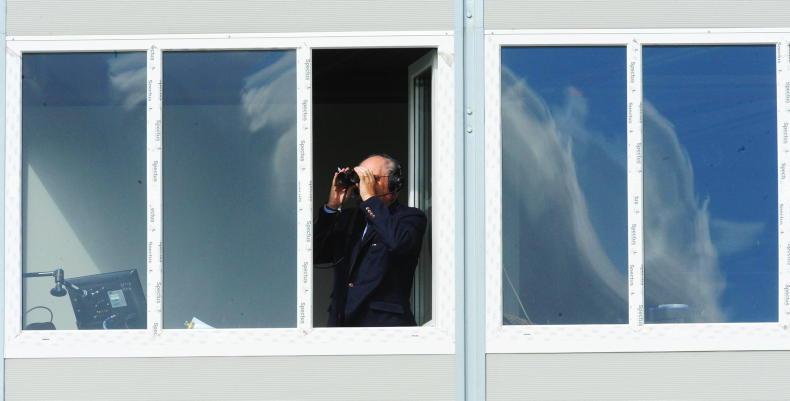WE all find aspects of horse racing commentary which get on our nerves, whether that is the use of certain words or phrases or just an aversion to particular callers (they’re all lovely fellas, as I can attest having worked with many over the years). For the most part, the use of particular racing jargon doesn’t bother me and it’s only right that horse racing should have its own set of idiomatic language.
The fact that such expressions aren’t literal is perfectly understandable, so I won’t be having a rant about expressions such as “gave him the office” or even the much-lambasted “jumped from fence to fence”. I quite like the latter, and indeed similar expressions used by the likes of Richard Pitman and the late John Oaksey, because they are responsible for adding a little colour to my childhood obsessions. On the other hand, I get much more annoyed by people who scoff: “What’s he meant to do – jump in between the fences?”
I don’t mind racing cliches assuming that the person doling them out has a plentiful supply and my only real bugbear with horse racing jargon is where the terms are used out of context or simply inaccurate in the setting in which they are utilised. Don’t say “just got up” when you mean “just held on” for example, and you’ll avoid my wrath.
I’ll even forgive a senior commentator who – spotting a horse cruising into contention a furlong out – announced in a recent race call: “Oh this has won” shortly before identifying the horse in question. It did win, of course, and that’s what makes it easy to let it go. Getting it right can cover a multitude of sins, as St Peter might have said had he been writing an epistle to Christians in Asia Minor about this topic, rather than love.
Keep it simple
There is one word, however, that is doing its level best to ruin my entertainment when listening to racing commentary, and that is the word “up”, which is fine when used on its own but is increasingly added to perfectly serviceable words as a completely redundant prefix.
It’s becoming de rigueur for a horse to be described as “upholding a lead” of a few lengths or to hear that the pace “is uplifting” as the field turns for home.
Call me old fashioned, but it seems to me that the words “holding” and “lifting” have been doing a pretty solid job in this context without any need for a qualifier or prefix of any kind. In the context where uphold means maintain, suggesting a horse working to keep its rivals at bay, then I think that maintain works better in almost all cases, for all uphold is strictly correct. Where it’s used simply to mean hold, then hold is demonstrably preferable.
Ditto “lift” and “uplift”. Uplift, when used to describe a quickening of pace, may be grammatically correct, but when used to mean lift, then the question is why add an extra syllable for no greater meaning. Of course, “quickening”, or in some cases “collapsing”, are words more descriptive of what pace may do, and I’ve no problem with pace being “injected” from a tactical perspective.
I also don’t mind post-race analysis using the noun “uplift” to describe such an injection of pace, or indeed for the word “pace” to be substituted with “tempo” when it suits, but I can’t be doing with “uplifting” as a verb. It all so….unnecessary.
Of course, “up” is following hard on the heels of “out” as the most annoying syllable in the commentator’s lexicon, as in the hideous notion that races are being “taken out” by horses, or jockeys, or trainers, rather than simply being “won” or “taken”. The expression “taken out” has been known to cause some confusion, particularly when applied to Nicholas Parsons in the Comic Strip movie Mr Jolly Lives Next Door, but for the sake of clarity, while it may mean either “entertain” or “murder”, it should never mean “win”. Now, please stop it.
Uncompromising
Advocates of “take out”, or “take-out merchants” as they should henceforth be known, will point out that language is constantly in a state of flux and new idioms pop up all the time, but while I can reluctantly concede that, there are also cases of language which is just plain wrong, and which must be opposed on a point of principle.
An expression I’ve heard more and more in recent times, particularly in commentary or post-race analysis, is that a particular horse has “come from an uncompromising position”. This is an egregious error and one for which no excuses can be made. Uncompromising when used in this manner to mean difficult or disadvantageous is simply the wrong word.
The Reverend Ian Paisley could have told us plenty about uncompromising positions, and I have no intention of compromising my own view on this specific example; it’s perfectly fair to describe a horse’s chance as being compromised by factors within a race, such as being held up too far off a slow pace, but even if you do maintain that logic, it does not mean for a second that the horse came from an “uncompromising position”.
It would be more accurate to say that such horses have “come from a compromising position”, but still wrong. Compromising positions are what Tory MPs find themselves in shortly before resigning to spend more time with their respective families. The simple truth here is that the word commentators are looking for is not “uncompromising” at all, but plain old “unpromising”, which sums up the scenario in a way that uncompromising utterly fails to. Sometimes it’s the simple words that work best, and trying too hard to look clever can have the opposite effect.




 This is a subscriber-only article
This is a subscriber-only article
 It looks like you're browsing in private mode
It looks like you're browsing in private mode






SHARING OPTIONS: